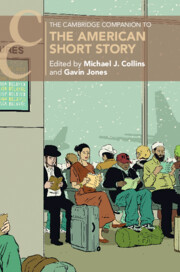Book contents
- The Cambridge Companion to the American Short Story
- The Cambridge Companion to the American Short Story
- Copyright page
- Contents
- Figures
- Tables
- Contributors
- Chronology
- Introduction
- Part I Contexts
- Chapter 1 Transatlantic Print Culture and the Emergence of Short Narratives
- Chapter 2 The Short Story and the Early Magazine
- Chapter 3 The Short Story Fad
- Chapter 4 The Best of the Best
- Chapter 5 The Story of a Semester
- Chapter 6 The Short Story in the Age of the Internet
- Part II Histories
- Part III People and Places
- Part IV Theories
- Notes
- Further Reading
- Index
- Cambridge Companions to…
- References
Chapter 1 - Transatlantic Print Culture and the Emergence of Short Narratives
from Part I - Contexts
Published online by Cambridge University Press: 11 May 2023
- The Cambridge Companion to the American Short Story
- The Cambridge Companion to the American Short Story
- Copyright page
- Contents
- Figures
- Tables
- Contributors
- Chronology
- Introduction
- Part I Contexts
- Chapter 1 Transatlantic Print Culture and the Emergence of Short Narratives
- Chapter 2 The Short Story and the Early Magazine
- Chapter 3 The Short Story Fad
- Chapter 4 The Best of the Best
- Chapter 5 The Story of a Semester
- Chapter 6 The Short Story in the Age of the Internet
- Part II Histories
- Part III People and Places
- Part IV Theories
- Notes
- Further Reading
- Index
- Cambridge Companions to…
- References
Summary
The chapter explores the emergence of the American short story in the context of a “culture of wonder” that dominated the Atlantic world of print prior to Washington Irving. Although ghost stories, and tales of apparitions and witchcraft were often discarded as formless pieces, these “small tales” were widely reprinted in the pages of early transatlantic magazines, fostering sensational effects as well as transgressive stories about individuals whose behavior was outside the norm. The chapter examines the circulation of early short narratives in the context of serialized imprints such as magazines and newspapers. It focuses on popular topics such as ghost stories and sensationalistic tales. Moreover, the chapter unearths the rich archive of transatlantic storytelling, demonstrating how the short form combines oral and textual performances conditioning the nineteenth-century tale as it can be found in the writings of Washington Irving and Edgar Allan Poe.
Keywords
- Type
- Chapter
- Information
- The Cambridge Companion to the American Short Story , pp. 17 - 30Publisher: Cambridge University PressPrint publication year: 2023

